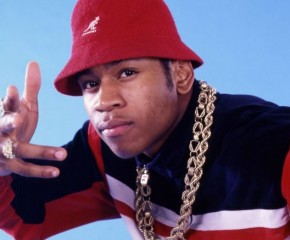 29 years ago, the genre of hip-hop was forever changed when a brash teenager from Queens released his debut 12″, “I Need a Beat.” That teenager, James Todd Smith, became commonly known as LL Cool J, and became an icon.
29 years ago, the genre of hip-hop was forever changed when a brash teenager from Queens released his debut 12″, “I Need a Beat.” That teenager, James Todd Smith, became commonly known as LL Cool J, and became an icon.
In the years since, LL has done more trailblazing than just about any other solo MC in history. He successfully transitioned through at least three different phases of hip-hop, he attained crossover success without losing his ghetto pass (even though he had to fight for it a couple of times,) he proved that being a sex symbol and being a dope emcee weren’t mutually exclusive. He put hip-hop’s most important label-Def Jam-on the map. He was the first solo MC to guest on “Saturday Night Live”-and he tore it down. He was the first rapper on MTV’s “Unplugged”-and he tore it down (deodorant stains and all.) He has 12 albums that have gone at least Gold, in addition to two Grammys. “I Need Love” was the first rap song to hit #1 on Billboard’s Top R&B singles chart. He took on Kool Moe Dee, Canibus, Ice-T and MC Hammer, and lyrically withstood all four. If you missed the memo back in 1987, LL’s BAD!!
Despite the fact that he’s been either recycling himself or shamelessly following trends for the past fifteen years, we still have love for Uncle L., so Big Money and GG went halfsies on his catalog, taking a ride down Memory Lane and listening to (and reviewing) all of his albums. Hope you enjoy!
Radio (1986)
 Not even eighteen years of age yet, LL Cool J recorded and released Radio, which was just over a year after he recorded the demo to “I Need A Beat” and sent it to Rick Rubin and Russell Simmons’ newly formed Def Jam label. LL’s first album is seasoned. As an MC, he sounds like a pro rather than a rookie, even if his lyrics aren’t too substantial. He’s not rapping about anything important, but then again, he was a teenager and the songs were fun spirited, even in dissing Yvette in “Dear Yvette.” LL just wants you to stay away from Yvette.
Not even eighteen years of age yet, LL Cool J recorded and released Radio, which was just over a year after he recorded the demo to “I Need A Beat” and sent it to Rick Rubin and Russell Simmons’ newly formed Def Jam label. LL’s first album is seasoned. As an MC, he sounds like a pro rather than a rookie, even if his lyrics aren’t too substantial. He’s not rapping about anything important, but then again, he was a teenager and the songs were fun spirited, even in dissing Yvette in “Dear Yvette.” LL just wants you to stay away from Yvette.
There are some certifiable LL classics on Radio. “Rock The Bells” is one of the best five songs of his career. LL was hongry (not hungry, hongry). Listening to “I Can’t Live Without My Radio,” it amazed me at how energetic and charismatic he was compared to rappers of today. “That’s A Lie” still cracks me up. And if you hear closely, you’ll hear Russell Simmons who is lying about the lies that he lied about. The production was sparse which was the Rick Rubin blueprint, but the sound is classic. It’s one of LL’s best albums and the dude recorded it before he would’ve been allowed to vote. (GG)
Grade: B+
Bigger & Deffer (1987)
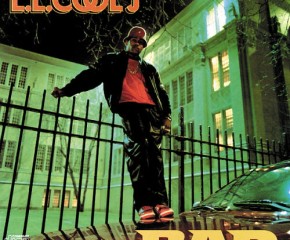 In terms of the commercial success of hip-hop, there was Run-DMC, there was the Beastie Boys, and then there was LL. The rap music holy trinity. Hip-hop’s first mass appeal solo artist, 1987’s Bigger & Deffer was his breakthrough album. As a piece of music, it’s certainly the last gasp of the “old school,” (I mean, the REALLY old school,) as Boogie Down Productions, Public Enemy and Eric B. & Rakim would make the simple style of hip-hop storytelling passe by the end of 1987. With a quarter century having passed since its release, it’s almost shocking to remember how good a structural emcee LL was. Those who react strongly to his appearance on best of all time lists should go back to albums like BAD and realize how hungry (or as GG says, “Hongry.”) and skillful a rapper he was. Beats wise, BAD is pretty rudimentary, so you’re pretty much just listening to the lyrics anyway. The storytelling here is supreme, whether he’s cracking on hoes (“The Bristol Hotel”) shouting out his DJ (the awesome “Go Cut Creator Go”) or just proclaiming how bad he is (“I’m Bad.”) Of course, BAD is also notable for featuring the first hit hip-hop ballad, “I Need Love.” Amazingly, that song isn’t as painful to listen to these days as you might think. The album as a whole sounds dated, and the subject matter is pretty limited, but it’s also one of the few essential and cohesive albums of rap’s first few years. (Big Money)
In terms of the commercial success of hip-hop, there was Run-DMC, there was the Beastie Boys, and then there was LL. The rap music holy trinity. Hip-hop’s first mass appeal solo artist, 1987’s Bigger & Deffer was his breakthrough album. As a piece of music, it’s certainly the last gasp of the “old school,” (I mean, the REALLY old school,) as Boogie Down Productions, Public Enemy and Eric B. & Rakim would make the simple style of hip-hop storytelling passe by the end of 1987. With a quarter century having passed since its release, it’s almost shocking to remember how good a structural emcee LL was. Those who react strongly to his appearance on best of all time lists should go back to albums like BAD and realize how hungry (or as GG says, “Hongry.”) and skillful a rapper he was. Beats wise, BAD is pretty rudimentary, so you’re pretty much just listening to the lyrics anyway. The storytelling here is supreme, whether he’s cracking on hoes (“The Bristol Hotel”) shouting out his DJ (the awesome “Go Cut Creator Go”) or just proclaiming how bad he is (“I’m Bad.”) Of course, BAD is also notable for featuring the first hit hip-hop ballad, “I Need Love.” Amazingly, that song isn’t as painful to listen to these days as you might think. The album as a whole sounds dated, and the subject matter is pretty limited, but it’s also one of the few essential and cohesive albums of rap’s first few years. (Big Money)
Grade: B
Walking with a Panther (1989)
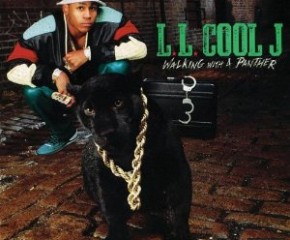 All too often, there comes a time in a rapper’s life where he starts to feel himself a little too much. This happened a few different times in LL Cool J’s career, but this was the first time. Had LL already become outdated? Had he become corny? The answer to both of those questions was yes. In the previous two reviews, Big Money and I talk about a certain hunger that you could hear in his voice. By the time of Walking With A Panther, that hunger was gone. He was a star and became lazy. It happens.
All too often, there comes a time in a rapper’s life where he starts to feel himself a little too much. This happened a few different times in LL Cool J’s career, but this was the first time. Had LL already become outdated? Had he become corny? The answer to both of those questions was yes. In the previous two reviews, Big Money and I talk about a certain hunger that you could hear in his voice. By the time of Walking With A Panther, that hunger was gone. He was a star and became lazy. It happens.
LL even called it. On “Why Do You Think They Call It Dope,” he says, “Will he ever make another Rock the Bells?/Yo brothers is comin’ up, I think he’s fallin’ off /I don’t think he’s still hard as hell.” He knew it was coming and he couldn’t stop it.
All was not bad though. “Goin’ Back To Cali” is one of the most memorable songs of his career. “Big Ole Butt,” as silly as it is, talked about big butts before butt became “back”. And “Jingling Baby” was so hot, he released it again on his next album. The downfall? He tried to recreate “I Need Love” three different times and each song was worse than the prior. The album was also inflated with 18 songs on the CD release and two more on the cassette. Cut it in half and you can make a decent album. As it is, it’s barely halfway decent. (GG)
Grade: C
Mama Said Knock You Out (1990)
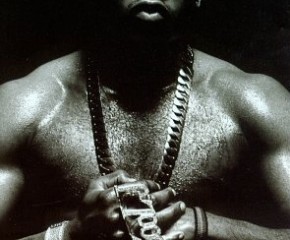 I may have been in the minority of people who actually enjoyed Walking with a Panther. In retrospect, there’s some good material on there, even if it’s way too long and the production (most of it by LL himself) is a little off. I’d give it maybe a B-. The hip-hop public reacted strongly, and negatively, to Panther, and less than 18 months after it was released, a new, modern LL was introduced to the world via Mama Said Knock You Out-an album that’s still the best thing he’s ever put on wax.
I may have been in the minority of people who actually enjoyed Walking with a Panther. In retrospect, there’s some good material on there, even if it’s way too long and the production (most of it by LL himself) is a little off. I’d give it maybe a B-. The hip-hop public reacted strongly, and negatively, to Panther, and less than 18 months after it was released, a new, modern LL was introduced to the world via Mama Said Knock You Out-an album that’s still the best thing he’s ever put on wax.
Even with a pair of side-ending clunkers (“Farmers Blvd. (Our Anthem)” and “The Power of God,”) Mama Said remains one of the most cohesive and listenable hip-hop albums of the Nineties, if not all time. Part of that is due to the streetwise production of Marley Marl, sure, but most of it is due to a focused, fiery LL. “Around the Way Girl” adapted his “I Need Love” steez for a New Jack Swing era, “The Boomin’ System” saw him jacking the hottest beat of the summer (an adaptation of James Brown’s “The Payback”) and adopting a Rakim-style flow. “Illegal Search” is a precursor to Jay-Z’s “99 Problems,” and “Cheesy Rat Blues” is a poignant tale of a star who was on top of the world and found himself crashing back to Earth with a thud. Then, of course, there’s the mighty title track, an incredible statement of purpose that still gets me amped after almost 25 years. This album earned LL his legendary status, won him his first Grammy, and is the only Cool J album that is absolutely a must-own. The mixture of confidence and desperation to not get labeled a has-been by the age of 25 resulted in a certified classic. (BM)
Grade: A
14 Shots to the Dome (1993)
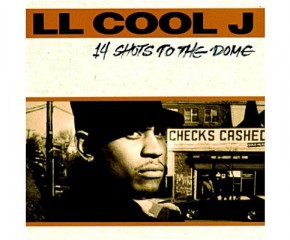 After the success of the best album of his career, LL charged hard to promote his next album. I remember seeing him at award shows name dropping his album forcefully while presenting awards. LL was always so smooth. This came across as a bit desperate. But he may have had reason to be a little desperate. How do you follow up a classic? And how do you give your fans what they want and still bring in new fans when the game is changing so quickly around you? 14 Shots To The Dome dropped in June of 1993. Later that year, Wu-Tang Clan dropped “Enter The Wu-Tang”. A Tribe Called Quest dropped “Midnight Marauders” around the same time. Compared to those albums, LL’s sounded tired.
After the success of the best album of his career, LL charged hard to promote his next album. I remember seeing him at award shows name dropping his album forcefully while presenting awards. LL was always so smooth. This came across as a bit desperate. But he may have had reason to be a little desperate. How do you follow up a classic? And how do you give your fans what they want and still bring in new fans when the game is changing so quickly around you? 14 Shots To The Dome dropped in June of 1993. Later that year, Wu-Tang Clan dropped “Enter The Wu-Tang”. A Tribe Called Quest dropped “Midnight Marauders” around the same time. Compared to those albums, LL’s sounded tired.
At one point, LL said, “Trend setter, I’m better.” He must’ve forgotten about that because 14 Shots features LL trying a mix and mash of different styles to keep up with what was hot, or at least, what he thought was hot. “How I’m Coming” features LL trying to go hard. He’s not quite thuggin’ it out gangster rap style, but it’s the closest he’d come. He tries a monotone style with “Pink Cookies In A Plastic Bag Getting Crushed By Buildings.” (By the way, I still have no idea based on the lyrics how this is about safe sex.) On “Straight From Queens,” his style morphs into a rapid paced style, hitting hard on every consonant. But because he’s LL, he can still be charming like on “Funkadelic Relic,” an autobiographical style of song that he’d go back to every once in awhile. “Back Seat” is immature, but it’s the kind of wink, wink, nudge, nudge song that he’s good at. (GG)
Grade: C-
Mr. Smith (1995)
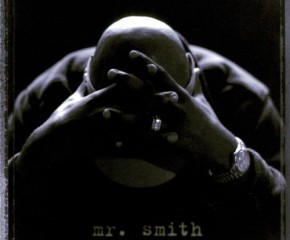 14 Shots to the Dome caught an L(L), and although Cool J was already recognized as a legend, he wasn’t exactly “A” list around this time. In the years between 14 Shots and Mr. Smith, hip-hop had officially become mainstream. Did LL want to go glossy, like The Notorious B.I.G.? Did he want to be hardcore, like Nas or Wu-Tang? Did he want to blaze his own trail? Mr. Smith finds him trying to be all of these things, and kinda failing miserably at each of them. Despite the fact that it went on to become one of LL’s most successful albums, Mr. Smith is kind of a mess. The production-courtesy of Trackmasters (sort of a second-rate Puff Daddy & the Hitmen)-is lowest common denominator beat jacking, and LL (who was a sitcom actor at this point-so much for “I guess I need a TV show to get mine/but I don’t feel like kissin’ no director’s behind”) didn’t give this album his all from a lyrical standpoint. The hunger that GG and I have mentioned several times in this essay is almost completely gone by this point.
14 Shots to the Dome caught an L(L), and although Cool J was already recognized as a legend, he wasn’t exactly “A” list around this time. In the years between 14 Shots and Mr. Smith, hip-hop had officially become mainstream. Did LL want to go glossy, like The Notorious B.I.G.? Did he want to be hardcore, like Nas or Wu-Tang? Did he want to blaze his own trail? Mr. Smith finds him trying to be all of these things, and kinda failing miserably at each of them. Despite the fact that it went on to become one of LL’s most successful albums, Mr. Smith is kind of a mess. The production-courtesy of Trackmasters (sort of a second-rate Puff Daddy & the Hitmen)-is lowest common denominator beat jacking, and LL (who was a sitcom actor at this point-so much for “I guess I need a TV show to get mine/but I don’t feel like kissin’ no director’s behind”) didn’t give this album his all from a lyrical standpoint. The hunger that GG and I have mentioned several times in this essay is almost completely gone by this point.
Amid the mess, there are a few highlights, including the smooth hit “Hey Lover,” the delightfully raunchy “Doin’ It” and the loving tribute “Hip-Hop,” but way too much of Mr. Smith feels like LL-by-numbers. Of course, the album went on to sell multi-platinum and spawn three of LL’s biggest radio hits. Don’t believe the hype, though. The majority of the album still sucks. (Big Money)
Grade: C
All World: Greatest Hits (1996)
The problem with greatest hits albums is, what happens when the artist goes on to have a ton more hits? This is the issue that presents itself with LL Cool J’s 1996 collection All World. LL’s first decade of hits is represented well here, with no major omissions. You even get remastered sound (fantastic for the older tracks) and the radio remix of “Loungin’,” which had never before been available on album. Of course, in the days of Spotify and a la carte music purchasing, you can make your own damn LL comp, and if you’re a huge fan, you’re gonna find a handful of things missing (although nothing that a supplemental purchase of Mama Said Knock You Out can’t fix.) So…what was kinda necessary 15 years ago is kinda redundant now. If you’re still a CD buyer, and you don’t have any LL Cool J at all in your collection, though, this is the comp to get. Or if you’re not the biggest fan of ’80s hip-hop and don’t feel the need to cop Radio or Bigger & Deffer.
Grade: B
And now it’s halftime, ladies and gentlemen. Pop some popcorn, grab a brewski, and come back tomorrow to check out what we think about the rest of LL Cool J’s albums!


8 comments
GG says:
May 6, 2013
This was a lot of fun. LL hardcore fans may get upset with us in part two though.
Big Money says:
May 6, 2013
I’ll patiently wait for Brian’s comments.
Big Money says:
May 7, 2013
Not gonna lie. I would’ve given both “Panther” and “14 Shots” higher ratings. “Panther” had some good stuff but was just too damn long. “14 Shots” had some clunkers, but it also had some dope-ass songs. Love “Funkadelic Relic,” “Back Seat,” and the song with Lords of the Underground. “Stand By Your Man” is good too.
GG says:
May 7, 2013
BAD is his second best album to me. It’s an A-. But while our general ratings may not be 100% in sync, I don’t think we were drastically different as in, you wanted an album to be an A and I had it as a C.
Big Money says:
May 7, 2013
Oh, not at all. We’re both at least in the same ballpark.
Jeff Wilder says:
May 7, 2013
I agree with Big Money Mike on 14 Shots. It had some filler no question. But the good stuff on it would make me give it at least a B. All the others would get at least a B- on my scale.
GG says:
May 8, 2013
I have such a love/hate relationship with that album. Actually, I’ve probably heard it at least third most of any LL album.
After Mama Said, I was drooling for it. Just couldn’t get enough LL at that time. And it just wasn’t there for me. In hindsight, that’s probably why I was so harsh on it. Maybe a C was a better score. Because it was still loads better than the latter half of his career.
Big Money says:
May 8, 2013
Yeah, man…I can’t believe he made us wait three years for that album.